The March for Science brought an estimated 150,000 scientists and science advocates onto the streets of Washington DC on 22 April in a show of support for US research. The marchers were there to demand that the White House and Congress support publicly funded research and base government policy on sound science and facts. There were more than 600 satellite marches in cities across the world, with hundreds of thousands participating in the protest, which was timed to coincide with Earth Day.
‘Despite the rain, tens of thousands of people came to the Washington Monument grounds in Washington DC from all parts of the country and possibly the world to take a stand for evidence-based policy and scientific research,’ says Dan Abrams, who is the global director of Earth Day for the Earth Day Network, a co-organiser of the DC march. Many participants at the Washington DC rally commented that the grey and rainy weather was a good metaphor for the bleak mood in the US science community.
Thomas Duncan, a biochemist at the State University of New York’s Upstate Medical University, said he has a research grant currently undergoing peer review at the National Institutes of Health (NIH). ‘If the funding is cut the way they are talking about cutting it, that is going to have a devastating effect not just on my research but on many people’s research programmes,’ he warned. Duncan said he hopes the Trump administration will see enough impact from the protest to recognise the need for supporting scientific research as much as other areas, such as defence.
Countering cuts
Trump has proposed immediate cuts to major research agencies like the NIH and the National Science Foundation in his budget plan for 2017, which ends on 30 September. In addition, the president’s budget blueprint for 2018, released earlier this year, would boost defence spending by $54 billion through significant cuts to programmes like scientific research. It specifically proposes to slash the NIH and Department of Energy’s Office of Science budgets by 20%, and to cut funding for the Environmental Protection Agency’s research arm in half.
A third-year PhD chemistry student at Pennsylvania State University who identified himself only as Scott described marching as cathartic. ‘It is a way for me to express my concerns for science funding, and my fear for the future of the climate,’ he said. A major concern for him is that less public funding could lead to fewer research positions at US universities. ‘Industry, I think, will be fine, so that is probably where I will be going,’ he said. ‘If there was more funding, then academia would definitely be a place that I would want to go, but since there is going to be less in the next few years, I think that industry is a lot safer.’
The American Association for the Advancement of Sciences’ chief executive, Rush Holt, was among the many who addressed the crowd at the march. ‘Science is too important to people’s lives to be denied or downgraded,’ said Holt, a former congressman and physicist. ‘Science needs certain conditions to thrive – free exchange of ideas, freedom to travel and collaborate, diversity of people and perspectives, and ample public funding,’ he added. ‘These conditions are threatened today, and we must defend them.’
Political science?
William Gunn, director of Elsevier’s scholarly communications, who attended the march in a personal capacity, said he and other scientists feel more threatened than they have in the past, noting that he was doing stem cell research back when George W Bush was the president. ‘I am not naive enough to think that an administration that has gotten rid of the President’s Council of Advisors on Science and Technology (PCAST) is going to see people marching on the street and raise funding for science, but it is really more about the impression that it makes on average people,’ he told Chemistry World.
In the months leading up to the March for Science, many in the research community worried that aligning the event with Earth Day could dilute the march’s message and turn scientists into just another special interest group. However, participants on the march rejected such criticisms. They claimed to be defending science, not politicising it.
‘The more people who are interested in science and saving our planet, the better off we are,’ said Meredith Rocca, a toxicologist at Janssen Pharmaceuticals in Pennsylvania. ‘Science has become a political issue, and therefore I think it is important to stand up and say that it shouldn’t be a political issue.’










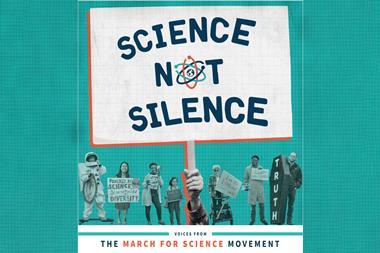
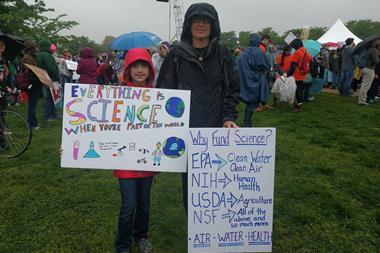
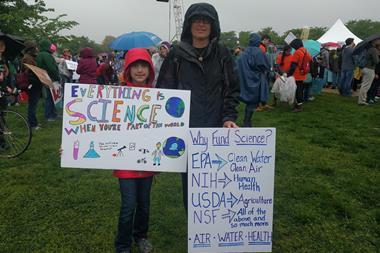

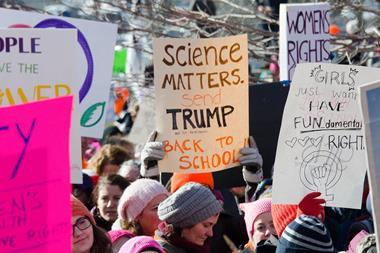
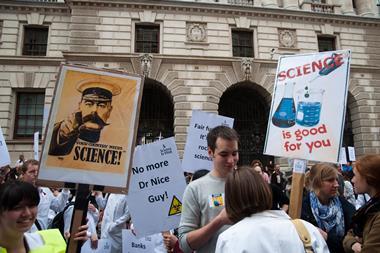


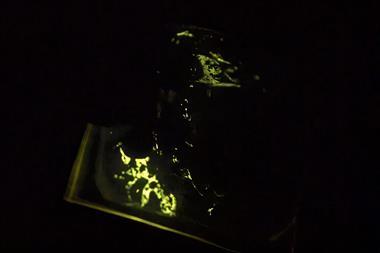







No comments yet